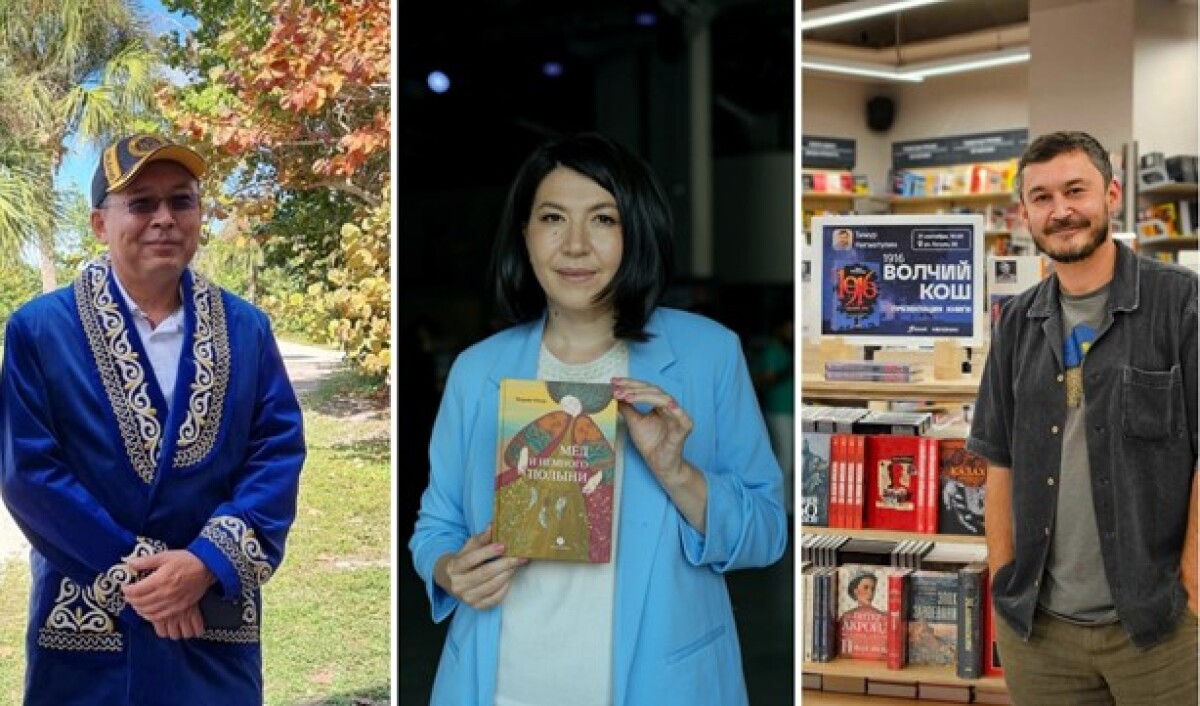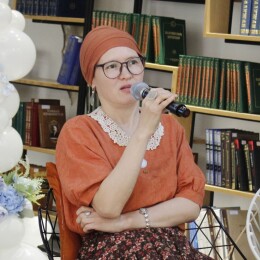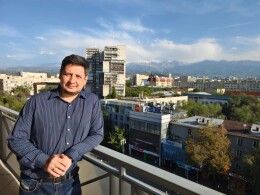Over recent years, the number of Kazakh writers publishing their works as well as the interest to Kazakh literature not only on the part of Kazakh citizens but also on the part of the world community have been increasing, which is certainly gratifying.
This material presents a conversation with three contemporary Kazakh writers of different ages and academic and life backgrounds, who published their books in the current and last year. They are Azat Battakov with the book "Primary Evil", Mariya Omar with the book "Honey and a Touch of Wormwood" and Timur Nigmatullin with the book "1916. Wolf Pack".
- Please, could tell us about the history of the book. Were there any difficulties, casual moments, who supported and believed in you during the writing process?
Azat Battakov: Before the novel "Primary Evil", I had already written stories and some of them were even published, for example. in the literary online magazine "Dactyl". Therefore, I was generally ready to write something more. At the same time, I had several ideas. but, considering that I am a lawyer, I decided to focus on a detective, given the fact that in my youth I worked a little as an investigation officer in the Soviet militia.
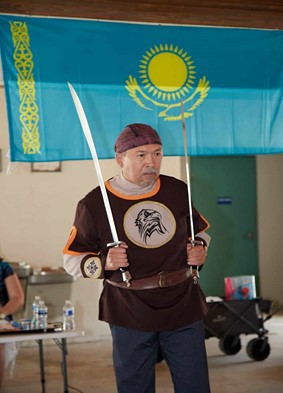
This work is dirty and hard, but there are also, oddly enough, honest and selfless people. Besides, I would like to write about the city Karaganda, where I was born, grew up and took my first steps in the profession, in particular, about Karaganda at the turn of the 70-80s of the last century. My mentor, Ilya Odegov, a wonderful person and writer, supported and guided me in this.
Mariya Omar: I decided to write this book many years ago, it is based on the history of my family. The main character is my maternal grandmother, Akbalzhan azhe, who had a complex and unusual life. I've always wanted to talk about it, because her story surprises and inspires. The difficulties were in building a structure, making a coherent artistic text out of a lot of fragmentary memories and testimonies, which is interesting for people to read. I have almost never had to invent a plot, it was written by life, however, it was important to fill it with details and emotions so that the reader could feel the emotions of the characters and their motives. My family, masters and fellow students from literary schools, as well as online friends supported me. I posted a part of the text on social networks and shared my experiences when the book could not be published immediately. When it was finally published, some people wrote to me that they felt joy, as if they had released the book themselves.
Timur Nigmatullin: I wrote the first chapter of the book in 2016, and it was in the first person, and in a completely different genre. By design, everything was different in that plot, the classic version of finding an old letter in the attic. I wrote, put it aside. Two years later, I wrote the second chapter, and again put it aside. Only in 2021, I returned to the manuscript. I deleted the first chapter and started writing from the second one. The work took six months before editing and a month for editing. I was lucky with the teachers, on the one hand there was Ilya Odegov, who believed in me so strongly that I had no chance not to write, at any moment he said, "Let's move on. Everything is fine." He is a great motivator, coach and teacher. On the other hand, I worked with Alina Gatina. There was more work with language here. She understands the language at the molecular level, immediately sees the traps for the author and the wrong narrative. That is, she is not just an editor or a corrector of errors, but a person who sees the tone and the sound of the text on both small and large scales. Sometimes I was angry, but on the contrary it's good, you work on the text more. And on the third hand it is my wife. She is both the first reader and the first critic, and in general the first person who sees the text. It depends on her opinion whether I will rewrite or not. You write for eight hours, she reads, and says where I need to rewrite, and I am also initially angry, and then sit at the table for eight hours again. Actually, those are all the people who supported, helped and believed in me. Thanks a lot to them for that.
- What is the main idea and message of the book?
Azat Battakov: The main idea of the book, no matter how trite it sounds, is the fight against evil, which has many manifestations, but often happens in its purest form, for instance, in the murder of their own kind. And on the other hand, my book is certainly the entertainment literature, I would say, a typical "crime fiction", although it is written on the basis of a real story. I personally know people who served as prototypes of some characters. The image of the main character Dastan is collective, the same applies to other characters. At the same time, the book, although based on real events and the plot develops according to the main episodes of the case of the sensational serial gang of murderers at that time, nicknamed in Karaganda "Wolf Pack", is still fiction, like other similar works of the detective genre. That's why, I didn't really limit my imagination.
Mariya Omar: At first, my main motive was to leave the memory of my family after my father died. That is, it wasn't like I came up with a cross-cutting idea in advance and wrote a book. I had several plots and when I put them together in a single line, looked at the history of my family as if from the outside, I had personal insights and I found new meanings in this story.
Probably the most important message of the book for me is that a person, even in the most difficult circumstances, makes their own choice, and their fate and even the fate of their descendants depends on it. Even during the famine and devastation, my grandmother was able to find the determination to leave her husband with two small children, because she could not live like that anymore. And it completely changed not only her picture of the world, but also the life and mental attitudes of her descendants. I think this influenced the fact that my mother and I initially would not be able to tolerate a man with certain qualities next to us. In a message to my children , I wrote, “This book was written, among other things, in order that you would find out how many events happened – random and non-random, intertwined destinies, complicated choices were made so that we were born.” And indeed, if there had not been a negative situation in my grandmother's first family, if she had not left, she would not have met my grandfather, and I would not have been born. It's amazing to think about that.
In fact, every reader finds something different in the book. For instance, one woman who was left without a husband with two children told me that she found the strength after this book and thought that if the heroine could survive in such a difficult time, then she could as well. Another reader wrote that she finally understood what real men are. Most readers tell me that during the reading they remembered their grandmothers, thought about their ancestors and what they went through to continue the family. One young girl said important words, “I thought what kind of mother I would be.”
Timur Nigmatullin: There are no bad people, but there are bad stories. And who you will remain in this story is up to you. There are no bad or good ones in the novel itself either. At least for me. Readers tell it as it is. If you dig deep about the idea, then the story itself, as an object, is not a constant value. If not every year, then every decade is rewritten. I tried to do it as well. The plot itself is simple, the genre is eastern, the action takes place in the city of Akmolinsk in 1916. Some people need papers, others need money, and third ones don't know who to sell themselves to. And the fourth ones just want to go home.
- Could you tell us about your writing career, how did you come to this and for what period of time?
Azat Battakov: I have come to writing recently. There was no time before because I worked as a lawyer and manager in business and banks. Of course, I also wrote articles on legal topics, sometimes even journalistic articles. About seven years ago I wrote my first story - "The Bay Comes at Dawn", which was published in the almanac "Literary Alma-Ata". And there's more to come.
Mariya Omar: I worked as a journalist in newspapers for many years, I wrote on social topics and about the fate of people, this has always been my favorite topic. I like to collect ancestral stories and write them down.
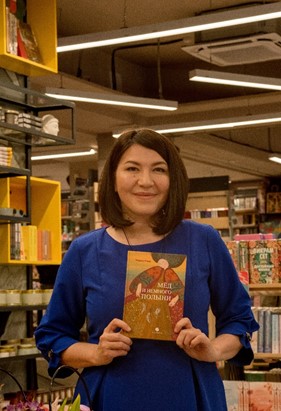
But I wrote in a journalistic style. I wanted to write a fiction book, and I had to learn this. For about two years, I had attended various literary courses, mainly in an online format, and had consulted with writers. While writing the book, I studied literary techniques and immediately implemented them. Therefore, this book is a big step not only in my personal but also in my professional development.
Timur Nigmatullin: I've been writing for a long time, but I started composing even earlier. By the age of forty, it was no longer convenient to compose, in direct communication with people, in conversations and deeds, and I switched to paper. No one is nervous here anymore, no one is angry. On the contrary, it would seem that a halo of significance was added to the ordinary and habitual action. Sitting-writing-working! And in general it is the same. I used to write short stories. Then I tried to write a novel. It became the novel "I'm not lying, Mom" and it was even included in the long list of the AST publishing house, in the Friendship of Peoples magazine. Then, I started writing the "1916. Wolf Pack" book, and it was published. These days, I started writing again. This is such an ongoing process.
- What is writing for you?
Azat Battakov: Writing for me is an opportunity to realize myself in another field. On the one hand, I left my first specialty, I became an instructor of tai chi, a martial art and wellness practice, which used to be my favorite hobby, but eventually became a profession. On the other hand, I have been a passionate bibliophile since childhood. Thus, I decided to try myself in this area.
Mariya Omar: Writing for me is an opportunity to express my feelings and experiences, rethink experiences, tell stories that can inspire others or make them think about something. In fact, this is life for me, I constantly write.
Timur Nigmatullin: It is my favorite activity. If it were possible to live on it, then it would become my only occupation. I like that there is no team or need to run after anyone, just you and piece of paper. I write without a plan or structure. I don't prepare in advance, but just try not to waste emotions. Therefore, it is more convenient for me to write alone. Thus, I wrote "1916. Wolf Pack" in the country house. among zucchini and corn, in silence, under the hooting of an owl. If I want to make myself laugh, I write in a funny way, and if I want to be sad, I start writing the text at night. It is also important to stop in time. Sometimes I sit down for a chapter, but write a completely different story.
- Who is your main motivator or role model in this difficult, but very interesting case as writing?
Azat Battakov: It is interesting that the main motivator for me was my friend, a real intellectual and the same fierce book lover Aidyn Bikebayev, also a lawyer as I am. He himself has moved away from his writing plans, unfortunately. But he inspired me and keeps inspiring me very much. And I am eternally grateful to him for that. Of course, I am also grateful to Ilya Odegov, my constant mentor and a talented writer's teacher.
Mariya Omar: I don't have one role model, I learn something different from every teacher or author who inspired me. For example, I recently studied at the courses of the writer Yelena Chizhova. She taught me to build a text around a fabulous conflict in order to reveal it as much as possible, and to cut away the unnecessary. I adore Chekhov, who could aptly describe the hero's character through their behavior and words. Not so long ago, I discovered Annie Ernault, a French writer, winner of the 2022 Nobel Prize in Literature, "for the courage and clinical acuteness with which she reveals the roots, alienation and collective limitations of personal memory." Her works for me are an example of how one can openly show their pain, be as naked and natural as possible, but at the same time “not shout” with the text. Under the impression of her novel, I wrote the text, and it turned out to be completely different.
Timur Nigmatullin: I like certain books. It often happens that I like a writer by one book, then I take another one, but don't like it. That's why I stopped choosing by writer's name. Only books. I love almost all Dumbadze's works, also Ivanov's "The Heart of Parma", Pelevin's "Chapayev and Void" and Gigolashvili's "The Devil's Wheel". I have read these books more than three times each. To be honest, I read a lot at school, and my favorite characters and stories remained in that period. Then I believed, immersed in the world of books.
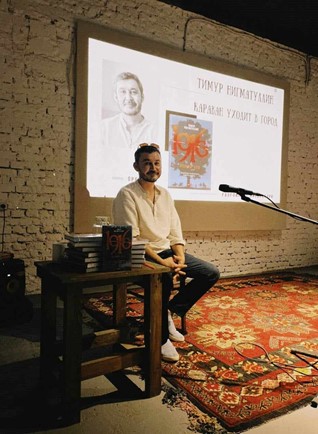
Now I rarely read, I watch more how the author works with the language, if I like it, then I go all the way with them. Recently, I have read the story "The Garden" by Alina Gatina, then I read it again and again. I'll read it again in a year. It's done skillfully. Answering the question, then the role model of the author, who can work in different genres, for example, Aleksey Tolstoy. Probably that is him, and only as a writer, without his other abilities.
- Your wishes to readers and aspiring writers.
Azat Battakov: It seems to me that other bibliophiles should try themselves in writing, that is, start writing, and then be published, which is not so hard these days, in general. And if someone likes it, then it turns out there will be a reader. I'm a beginner myself, but I know for sure that you get something only if you do it, but not postpone it.
Mariya Omar: For aspiring writers, including myself, I wish a burning inside and self-belief, so that they can remain sincere and honest, do not exchange what you want to write on topics that are popular, but do not touch them. And for readers wishing such books, after which they feel catharsis, purification and look at the world in a different way.
Timur Nigmatullin: Wishing for the first ones to read and for the second ones - to write, preferably high-quality literature. I always look at the level of cinema in Kazakhstan. The audience, if not all, then lots of them, can distinguish and choose which movie to go to. In the cinema, there is a process, a movement, and utter nonsense or a dummy will no longer gain viewers. In the Kazakh literature, things stand still. For thirty years there have been the same topics on the shelves about the search for Genghis Khan's footprints or the continuation of Yesenberlin, where the syllable, lines, and even the presentation of the story are the same. It seems that nomads wander from book to book, without even changing horses. This applies not only to historical prose. Thus, I would like writers to give readers something new and fresh. I believe that there will be much more people willing to read than there are now.
- Thank you for the interview and further success in your creative journey!
Azat Battakov: Thank you for your wishes!
Mariya Omar: Thank you for the interview and further success in your creative journey!
Timur Nigmatullin: Thank you for your questions, too. I was glad to answer.
Photos: from Azat Battakov’s, Mariya Omar’s and Timur Nigmatullin’s personal archives







